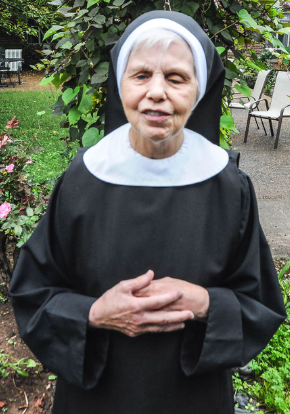Patron Stories: Sister Dolores

Ordinarily when I am asked to write or tell about myself, I cringe. In my mind there is nothing really special about me. I’ve been blind since birth, had a good education—ending up in a small women’s Catholic college, felt called to the religious life, entered a Benedictine monastery, needed to leave after ten years, primarily because technology was not really available in braille and I did not feel happy in my community. I married, after many years was widowed, and then rejoiced to return to my Benedictine community.
But when I was asked to write about my life with Xavier Society for the Blind, I was delighted. Xavier came into my life in the early 1950s. The very first book I received was a small copy of The Ordinary of the Mass. Never before was the Liturgy available. Just reciting the prayers with the congregation was great. Then I went to college. My friends were reading The Scarlet Lily, a novelized biography of Mary Magdalene—and it was in Braille. I could borrow it and feel one with those who loved the story. And then there was that wonderful novel, Sorrow Built a Bridge—the life of Rose Hawthorne. There was always a box coming to me and going back to Xavier. And this was good Catholic literature.
In the monastery I recall meditating on de Caussade’s Abandonment to Divine Providence, Thompsen’s The Hound of Heaven and The Imitation of Christ. These were all in braille which meant that I could read and reread and reread again. And much later there was the entire New American Bible all 45 volumes—a monumental and momentous undertaking!
Being a Benedictine means that we recited the Divine Office or as it is termed today, the Opus Dei. We were praying in Latin. With the help of a sister, I transcribed the entire Office into Braille in Latin. As I submitted the volumes, the staff at Xavier bound them for me. What a thrill it was to have the text and pray with my community.
During those days I was able to transcribe two or three books for Xavier. The transcriptions were arduous jobs—all done using a braille slate and stylus. To tell you that I had plenty of callouses on my fingers is an understatement. Yet this was meaningful work and I loved it.
Over the years I became a certified proofreader and a certified transcriber and I did both for Xavier. Again, the work has been very special to me.
My life with Xavier covers more than books. It was my privilege to know many of those who worked for the visually impaired. I knew and loved and was encouraged by Fathers Klocke and McGratty. My close friends included Ann Murray, Mary Agnes (whose last name I can’t recall), Patty Mount who died tragically, and Jim Roeder. Now I count Terrence as a good friend and colleague—all wonderful and caring people. Each of them provided us with books which we could never have found anywhere else. They understood our craving for Catholic literature—modern and classic. Today, while there are many avenues available to obtain the books we crave, in the past this would not have been possible without the foresight of the Jesuit apostolate that chose to reach out with a special mission to the blind. All of your clients may not always remember the sacrifices that were made, but Xavier Society for the Blind has made a huge difference in our lives. Thank you.
